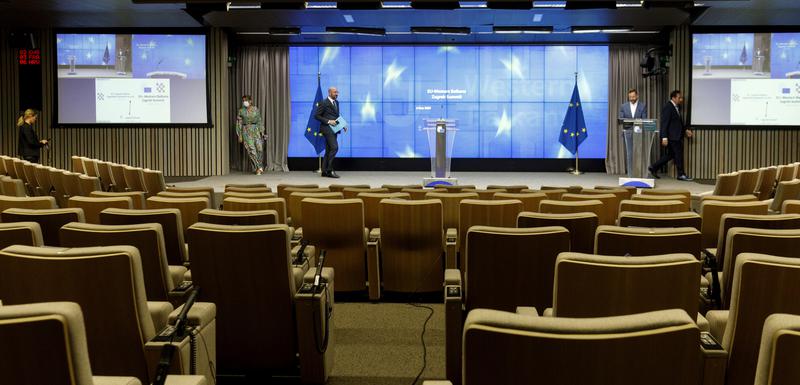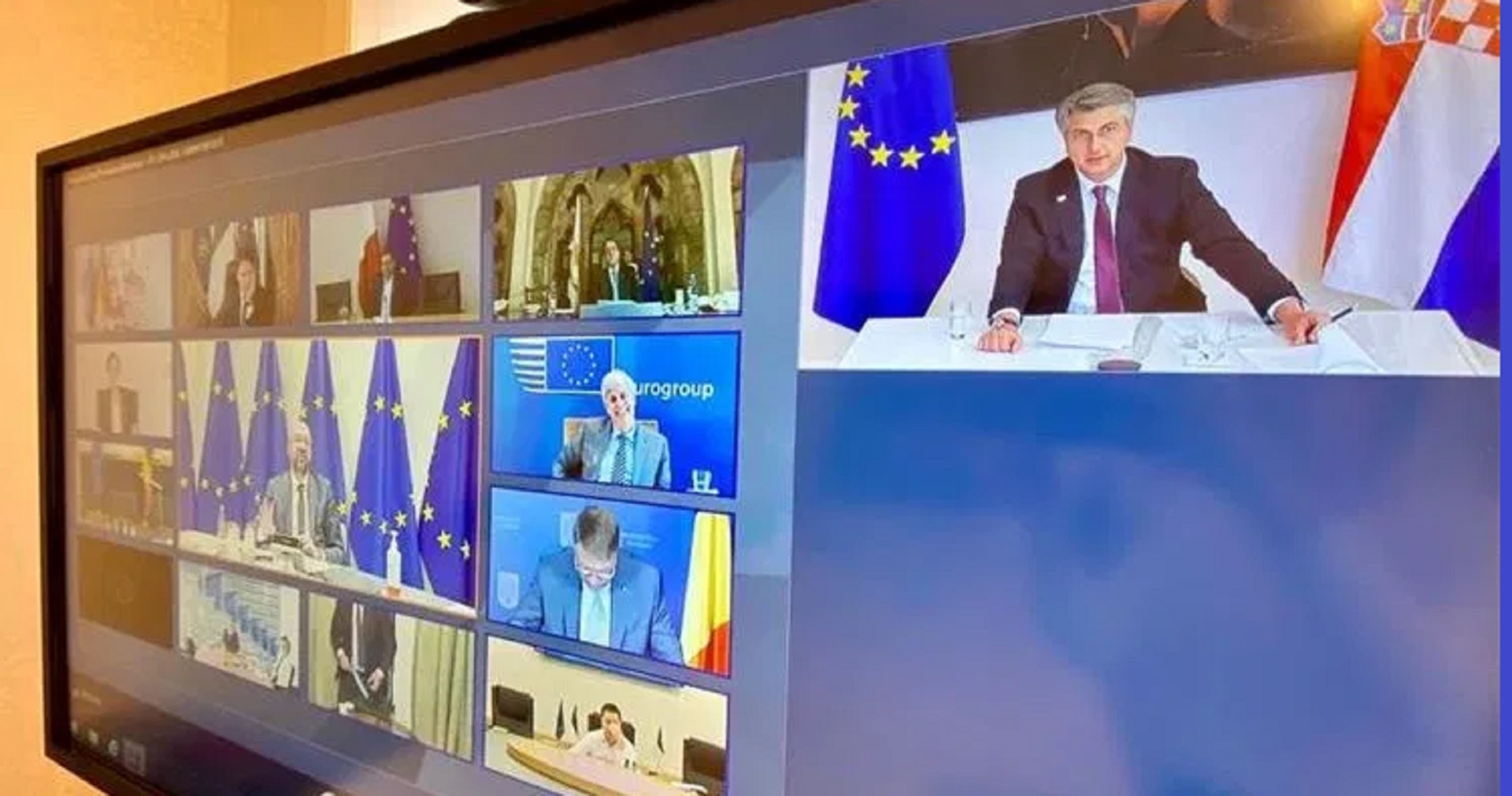 Deutsche Welle
Deutsche WelleDue to the coronavirus, the two-day summit mutated into a three-hour videoconference conversation with a focus on the COVID19 crisis, and the enlargement once again remained only in perspective.
The EU is currently offering solidarity to the Western Balkans in the fight against COVID19, enhanced political and economic engagement conditioned by effective reforms and a European perspective. The enlargement, they say, will be the second time.
The plan was to hold an EU-Western Balkans summit in Zagreb in early May, which was to mark the beginning of a new political and technical approach to the enlargement process. Due to the coronavirus, the two-day summit mutated into a three-hour videoconference conversation with a focus on the COVID19 crisis, and the enlargement once again remained only in perspective.
“The EU reaffirms its unequivocal support for the European perspective of the region,” reads the text of the “Zagreb Declaration” adopted during talks between EU and Western Balkan leaders.

It is added that the partners from the Western Balkans also reiterated their commitment to “the European perspective as their strategic choice”.
The declaration, signed by “EU leaders in consultation with Western Balkan leaders”, does not mention enlargement, integration, membership or at least the EU perspective of the Western Balkans in any of its 20 points on six pages. The promise of a “European perspective” to a region in the heart of Europe is a matter for both lecturers and politicians.
“Discussions on enlargement and political criteria are in the background in relation to the pandemic,” they explain in Brussels.
He added that the enlargement process is “ongoing and progressing” in its course and that the next opportunity to talk about EU enlargement to the Western Balkans will be in June at a meeting of the EU Council of Ministers. Putting enlargement policy aside is deja vu from the previous EU-Western Balkans leaders meeting in Sofia in 2018. Then, instead of a virus, the enlargement conversation was “eclipsed” by French President Emanuel Makron, insisting on internal reform of the Union. So the whole of 2018, heralded as “crucial to EU and Western Balkans enlargement and relations,” has been a fiasco.
The EU offers stronger engagement in the region, but also seeks stronger reforms
When it comes to 2020, its first part is in the sign of a coronavirus pandemic. Thus, the “Zagreb Declaration” devotes its first part to this state of emergency, which calls for “unity and solidarity”. The report points to the EU’s commitment to helping the Western Balkans combat the pandemic and its socio-economic consequences. Emphasis is placed on the 3.3 billion-euro package mobilized by the EU to help the Western Balkans, with the assessment that EU co-operation and support “far exceeds what other partners can provide to the region”. It is noted that the EU is ready to strengthen its engagement in the region, but under the condition of tangible progress in reforms.
“The countries of the Western Balkans must continue with reforms, especially in the area of the rule of law, democratic values and the fight against corruption. These are key areas for the well-being of citizens, but also for strengthening the EU-Western Balkan escort, ”says European Council President Charles Michel.
EU 27 leaders have called on colleagues from the Western Balkans to abide by and ensure a swift implementation of fundamental values, democratic principles and the rule of law, including during the pandemic emergency. This time as well, the EU calls on everyone in the Western Balkans to harmonize their foreign policy with the EU policy, but also to take decisive steps in the process of mutual reconciliation, cooperation and resolving bilateral problems.
“Regional co-operation and good neighborly relations are key to the region’s economic recovery. We know this very well in Europe because our single market is our strength, ”said European Commission President Ursula von der Lajen.
EU leaders and the European Commission have said that the pandemic and the adoption of the new multiannual EU budget framework will be followed by a major economic investment package for the Western Balkans that will focus on transport, energy infrastructure, green economic transformation and the region’s digital transition.
Have we agreed on a goal?
An interesting detail from this summit is that all participants were asked to participate in the video conference without presenting national features.
Brussels explains that the organization of this video conference, as well as the previous EU summit in the Western Balkans in Sofia, raised the issue of Kosovo’s status neutrality, which was “carefully resolved” by asking all students to use “similar backgrounds” to prevent “State symbols complicate video conferencing.”
Regardless of changes in format, details and agenda, and despite the recurrence of general places in the under-ambitious final declaration, Brussels estimates that video leaders’ conferences and other initiatives taken by the EU towards the Western Balkans are evidence that the region is an “absolute priority” and a “privileged partner” “Union.
“The Western Balkans belong to the EU and no one in the EU questions this,” Fon der Layen said.
At the end of the talks between the leaders of the EU and the Western Balkans, she concluded that enlargement is one of the most successful EU policies, which has brought peace, prosperity and stability to the European continent.
Although it does not mention enlargement, the “Zagreb Declaration” emphasizes that “the EU and the Western Balkans share the same goal”, which is “a peaceful, strong stable and united Europe”. It is added that this “same goal” is supported by “historical, cultural and geographical ties” but also by “common political, security and economic interests”.
What is not written in the conclusions of the meeting, and with which at least the leaders from the Western Balkans would agree, is that the goal is defined by enlargement and membership, and not by a time and politically indefinite perspective.
Napomena o autorskim pravima: Dozvoljeno preuzimanje sadržaja isključivo uz navođenje linka prema stranici našeg portala sa koje je sadržaj preuzet. Stavovi izraženi u ovom tekstu autorovi su i ne odražavaju nužno uredničku politiku The Balkantimes Press.
Copyright Notice: It is allowed to download the content only by providing a link to the page of our portal from which the content was downloaded. The views expressed in this text are those of the authors and do not necessarily reflect the editorial policies of The Balkantimes Press.

